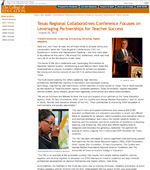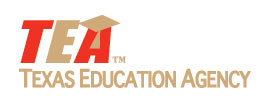Seventeenth Annual Meeting News Articles
 Texas Regional Collaboratives Conference Focuses on Leveraging Partnerships for Teacher Success
Texas Regional Collaboratives Conference Focuses on Leveraging Partnerships for Teacher Success
UT College of Education
(August 25, 2011)
Seventeenth Annual Meeting Video Clips
 Opening Luncheon Videos |
 Dinner Speaker Videos |
 Featured Speaker Videos |
 Closing Luncheon Videos |
 Attendee Feedback Videos |
|
Teaching and Mentoring Excellent Awards
 Shell |
|
| Science Mentoring Excellence Award | Science Mentoring Excellence Award |
 Laura Haralson Nocona High School Nocona ISD NCTC Regional Science Collaborative, Gainesville
|
 Robert Moore Mumford High School Mumford ISD TAMU-College Station Regional Science Collaborative, College Station
|
 AT&T Foundation |
|
| Science Mentoring Excellence Award | Math Teaching Excellence Award |
 Celina Terrones Earl Warren High School Northside ISD OLLU Regional Science Collaborative, San Antonio
|
 Mario Aguilar Oliveira Middle School Brownsville ISD UT Brownsville Regional Mathematics Collaborative, Brownsville
|
 El Paso Corporation |
|
| Science Teaching Excellence Award | Science Teaching Excellence Award |
 Daniel Plas Weslaco East High School Weslaco ISD UT Pan American Regional Science Collaborative, Edinburg
|
 Efren Rodriguez Science Academy South Texas ISD Region 1 Science Collaborative, Edinburg
|
 UT Center for Science and Mathematics Education |
|
| Math Mentoring Excellence Award | |
 Nichole Hahn Harry Herndon Intermediate Royse City ISD Region 10 Mathematics Collaborative, Richardson
|
|
| The Cynthia and George Mitchell Foundation Science Teaching Excellence Award |
|
 Jennifer Oramous Draper Intermediate Wylie ISD Region 10 Science Collaborative, Richardson |
|
Seventeenth Annual Meeting Photo Gallery
 Visit the Seventeenth Annual Meeting Photo Gallery to explore hundreds of categorized images from the conference.
Visit the Seventeenth Annual Meeting Photo Gallery to explore hundreds of categorized images from the conference.
Seventeenth Annual Meeting on TOLC
 We have invited all session leaders from the Seventeenth Annual Meeting to share their presentation materials and moderate followup discussion within a TOLC Special Interest Group created for this purpose. To access this TOLC resource you must be a member. If you are not already a TOLC member or have a TOLC-related question, please contact John Solis for assistance.
We have invited all session leaders from the Seventeenth Annual Meeting to share their presentation materials and moderate followup discussion within a TOLC Special Interest Group created for this purpose. To access this TOLC resource you must be a member. If you are not already a TOLC member or have a TOLC-related question, please contact John Solis for assistance.
Keynote Speaker
Francisco G. Cigarroa, M.D.
Chancellor, The University of Texas System
 As chancellor, Dr. Cigarroa oversees one of the largest public systems of higher education in the nation, with nine universities and six health institutions, an annual operating budget of $11.9 billion (FY 2010), including $2.5 billion in sponsored programs funded by federal, state, local and private sources, and more than 202,000 students and 84,000 employees.
As chancellor, Dr. Cigarroa oversees one of the largest public systems of higher education in the nation, with nine universities and six health institutions, an annual operating budget of $11.9 billion (FY 2010), including $2.5 billion in sponsored programs funded by federal, state, local and private sources, and more than 202,000 students and 84,000 employees.
Chancellor Cigarroa's full biography (PDF).
Kick-Off Luncheon: Teaching and Mentoring Awards

Tuesday, June 28
12:00 - 2:00 p.m.
The TRC Seventeenth Annual Meeting will Kick-Off at noon on Tuesday with a luncheon honoring eight outstanding TRC teachers for excellence in teaching and mentoring. Awards are sponsored by TRC corporate and foundation partners and given each year to a select group of educators nominated by their Project Directors for exceptional leadership and student support.

Showcase, Reception, and Dinner

Tuesday, June 28
Showcase and Reception
5:00 - 7:00 p.m.
The Showcase and Reception features Math and Science Education displays and demonstrations from around the state along with complimentary refreshments.
Dinner and Program
7:00 p.m.
Dr. Cigarroa will be the keynote speaker. The program will also include the presentation of the TRC 2011 Distinguished Service Award. For a full listing of speakers, please download the program of events for the evening.

General Sessions
|
Science Educators and Neuroscientists: Dr. Janet M. Dubinsky
|
|
Creating An Impact School Dr. Jim Knight
|
|
State of Mathematics & Science Education Dr. Everly Broadway Dr. Kenn Heydrick
|
Featured Sessions
|
Developing Mathematical Ideas Kristi Bracewell
|
|
SECO (State Energy Conservation Office) Activities Sara Flusche
|
|
Using math to fight infectious diseases Dr. Lauren Meyers
|
|
Engineering New Biotechnology at NASA Dr. Marguerite Sognier
|


 Dr. Dubinsky's presentation will explore the relationship between Neuroscience and Education. Why is Neuroscience Relevant to Education? How does education alter brains? How can neuroscience be used to increase the motivation of teachers and students?
Dr. Dubinsky's presentation will explore the relationship between Neuroscience and Education. Why is Neuroscience Relevant to Education? How does education alter brains? How can neuroscience be used to increase the motivation of teachers and students?
 This workshop describes high-leverage activities that educational leaders can employ to design professional learning which has an unmistakable impact on teaching. The content draws from ideas described in Jim Knight’s Unmistakable Impact, based on more than 18-years of research. Topics include: focusing professional learning on easy-to-understand professional learning targets; designing workshops, professional learning communities and other professional learning that support implementation of school improvement targets; employing principals, coaches, and central office staff to accelerate professional learning.
This workshop describes high-leverage activities that educational leaders can employ to design professional learning which has an unmistakable impact on teaching. The content draws from ideas described in Jim Knight’s Unmistakable Impact, based on more than 18-years of research. Topics include: focusing professional learning on easy-to-understand professional learning targets; designing workshops, professional learning communities and other professional learning that support implementation of school improvement targets; employing principals, coaches, and central office staff to accelerate professional learning.
 The past year has witnessed many exciting changes in mathematics and science education. Rigorous curriculum standards in mathematics are currently being developed. Teachers implemented new science curriculum standards. The new STAAR assessment program will measure student progress. Come hear about how you can join forces with TEA to help students prosper in a global community.
The past year has witnessed many exciting changes in mathematics and science education. Rigorous curriculum standards in mathematics are currently being developed. Teachers implemented new science curriculum standards. The new STAAR assessment program will measure student progress. Come hear about how you can join forces with TEA to help students prosper in a global community. Developing Mathematical Ideas (DMI) is a professional development curriculum designed to help teachers think through the major ideas of
Developing Mathematical Ideas (DMI) is a professional development curriculum designed to help teachers think through the major ideas of  Sara and teachers from NCTC will offer four different breakout sessions this year, each focusing on a different type of energy: wind, water, biomass, and solar. All the presentations will be in the Sabine room. Seating will be limited to 30 participants for each session; each attendee will walk away from the presentation with materials and equipment used in the session.
Sara and teachers from NCTC will offer four different breakout sessions this year, each focusing on a different type of energy: wind, water, biomass, and solar. All the presentations will be in the Sabine room. Seating will be limited to 30 participants for each session; each attendee will walk away from the presentation with materials and equipment used in the session.  As public health officials face the challenge of controlling the spread of infectious diseases around the globe, they are increasingly using math and computational methods to help understand and design effective intervention strategies. In this presentation, I will describe how simple mathematical concepts have helped the fight against diseases such as flu, SARS and HIV.
As public health officials face the challenge of controlling the spread of infectious diseases around the globe, they are increasingly using math and computational methods to help understand and design effective intervention strategies. In this presentation, I will describe how simple mathematical concepts have helped the fight against diseases such as flu, SARS and HIV. The Biomedical Engineering for Exploration Space Technology Lab (BEST) at NASA Johnson Space Center is unique as it is the only biomedical/cell biology laboratory integrated into an engineering environment. The focus of our team is to invent new biomedical technology to be used in future manned space exploration and also here on Earth. Learn how we integrate science, math, and engineering to create new, innovative, out of this world technologies! Includes a hands-on activity.
The Biomedical Engineering for Exploration Space Technology Lab (BEST) at NASA Johnson Space Center is unique as it is the only biomedical/cell biology laboratory integrated into an engineering environment. The focus of our team is to invent new biomedical technology to be used in future manned space exploration and also here on Earth. Learn how we integrate science, math, and engineering to create new, innovative, out of this world technologies! Includes a hands-on activity.




